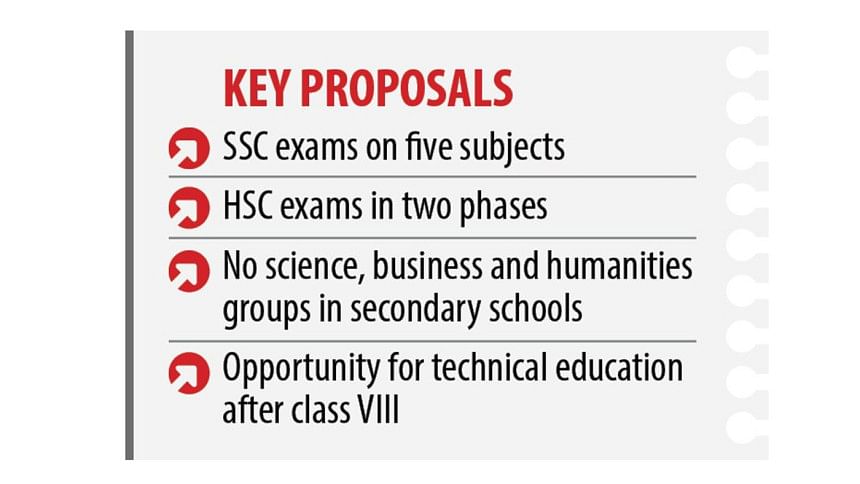Sweeping change to primary, secondary schooling

In a major policy shift in school education, the National Curriculum and Textbook Board (NCTB) has recommended holding the Secondary School Certificate (SSC) and equivalent exams on just five subjects, based on the syllabus of class X only, and the Higher Secondary Certificate (HSC) exams in two phases (in classes XI and XII). If implemented, this will mark a departure from the tradition of holding the exams at the end of their two-year periods. In another major shift, the NCTB has sought to move away from the highly unpopular Primary Education Completion (PEC) and Junior School Certificate (JSC) exams, respectively held at the end of class V and class VIII. NCTB officials said instead of holding the PEC and JSC exams, emphasis will be given on continuous student performance assessment at schools. Among other major suggestions are ending the practice of having separate "groups" for students of science, humanities and business studies at the school level, and having a two-day weekend in place instead of just one.
These reforms, if implemented even partially from January 2022, will change the face of school education as we know it. We are told that the NCTB is seeking opinion from all stakeholders, after which it will revise its draft curriculum outline and send it to the National Curriculum Coordination Committee. While the sweeping nature of the changes sought raises questions about the practicality of our education policies, there can be no question about two of the recommendations: the end of PEC and JSC exams, and the need for a two-day weekend starting Friday. Why the government introduced the PEC and JSC exams in the first place remains a mystery even 10 years after their implementation. Not having to worry about public exams at such an early age will no doubt be a big relief for the students, and will make learning significantly more fun and stress-free. Students should also have enough time to relax and play and acquire social skills, which is not possible with the present one-day weekend.
Ideally, we also agree with the logic for the elimination of the month-long, ritualistic and often emotionally draining exams taking place at the end of school and college years. It's nothing but a waste of time and energy. Any policymaking at this stage should focus on reducing unnecessary pressure on the students and finding quicker, more effective and flexible methods of performance assessment, but whether the course suggested by the NCTB is the way to go can be the subject of a healthy debate. We can begin with the questions: will holding the HSC exams in two phases increase their pressure rather than decreasing it? Will it be more cumbersome for the students and perhaps a logistical nightmare for the authorities? Again, any strategy in which the students have less exams to worry about is welcome, but it will be self-defeating if the time and energy saved in the process cannot be dedicated to improving the quality of their education.
The best course of action for the NCTB right now would be to engage the experts and NGOs working on school education and allow their opinion to be reflected in its final policy suggestions. The pandemic has laid bare the grim underbelly of our school education system. We must, therefore, be simultaneously practical and innovative as we chart our next path. The government should also stress more on improving the quality of education through more engaged and creative teaching and learning methods.

 For all latest news, follow The Daily Star's Google News channel.
For all latest news, follow The Daily Star's Google News channel. 



Comments